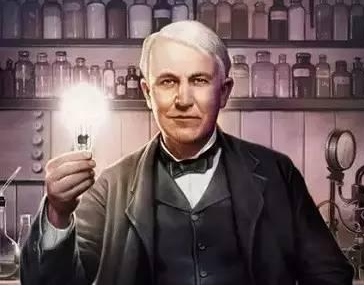One goes deep underwater and starves his brain of oxygen. Another works with a blindfold on, unable to see what he is doing. Another forced himself to sleep only three hours a night.
一个人跳入深水中,憋气让大脑缺氧;一个人蒙上眼睛,看不到自己在做什么;另一个人则强迫自己每晚只睡三个小时。
These are the bizarre techniques, which some geniuses use to get ideas and be productive.
这些都是一些怪癖,某些天才人士会这样做来获得灵感、让自己更具有创造性。
Of course, it is not essential (and certainly not recommended) to go to such extreme lengths to have a successful career.
当然,要获得成功的事业并不需要(当然也不建议)采取这么极端的做法。
However, for all those who struggle to be creative and want to know the secrets of famous scientists, writers and artists, here is a short guide to achieving dreams, the hard way.
但是,对于那些努力变得想要有创造性、想要知道那些著名科学家、作家和艺术家秘密的人来说,以下是一个指引你实现梦想的道路(困难版本)。

The Japanese inventor Yoshiro Nakamatsu, holder of 3,300 patents, father of the karaoke machine and the digital watch, forces himself to dive without oxygen, allowing the pressure from the water to starve his brain of blood. Then, he says, "zero-point-five seconds before death, I visualize an invention."
日本发明家中松义郎拥有3300项专利,还发明了卡拉OK和电子手表,他会强迫自己潜入水中憋气,使得水中的压力令其大脑供血不足。然后他就会说:“死前0.5秒,我想出了一个新发明。”
If this technique seems too insanely dangerous (and it does), a much safer option is to shut out all sensory stimuli from the surrounding environment. The author Jonathan Franzen, winner of the US National Book Award, puts on earplugs, earmuffs and a blindfold to improve concentration.
如果这个方法太危险(的确是),另外一个安全一点的作法是封闭自己所有的外界感官刺激。美国国家图书奖得主乔纳森·弗兰岑会戴上耳塞、耳罩和眼罩来提高集中力。
How does Franzen know what he is writing? He uses the little bumps on his keyboard's home keys to guide his fingers.
弗兰岑怎么知道他在写些什么?他利用键盘home键上的小突起来指引自己的手指。
Continuing the theme of self-denial, Thomas Edison, the inventor of the phonograph and the alkaline battery, robbed himself not of oxygen or light, but of sleep.
留声机和碱性电池的发明者托马斯·爱迪生也会自我否定,不过他不会让自己缺氧或者蒙上自己的眼睛,但是他会让自己不睡觉。
He is said to have worked for 72 hours straight when inspired by a project before putting his head down to rest.
据说他曾经在一个项目鼓舞下连续工作了72个小时,然后头一低就睡着了。
This, however, may have worked for Edison, but is not medically recommended for mere mortals, who are likely to suffer hallucinations and emotional breakdowns due to sleep deprivation.
但是这可能只对爱迪生有用,不推荐普通人这样做,因为睡眠不足可能会导致出现幻觉和情绪崩溃。
Beethoven, the famous composer, had a somewhat more agreeable method for getting his creative juices flowing. He would pour large pitchers of water over his hands while humming and singing to himself.
要让创造的思绪涌流,著名作曲家贝多芬有一个更令人愉快的方法。他会一边哼唱着歌曲,一边把大壶的水浇在自己手上。
Using this strategy, Beethoven wrote nine symphonies, 16 string quartets and 32 piano sonatas, so there must have been something to it. Apparently, however, his neighbors complained about all the noise.
通过使用这一方法,贝多芬创作了9部交响曲、16首弦乐四重奏和32首钢琴奏鸣曲,因此这种方法肯定有其用处。但是很显然,他的邻居们会抱怨这些噪音。
Charles Dickens, the nineteenth-century author, swore by the benefits of walking. He is said to have routinely walked up to 30 kilometers per day to get inspiration for his novels.
19世纪作家查尔斯·狄更斯对步行的好处非常肯定。据说他每天都要步行30多公里来寻找小说灵感。
Another odd technique, which is said to be common among highly successful individuals, is talking to themselves. The current world number one tennis player, Andy Murray, directs shouted obscenities at himself between points as a motivational aid.
还有另外一种奇怪的方法--据说是成功人士的共同点,他们会自言自语。目前排名世界第一的网球选手安迪·穆雷会在比赛的时候通过痛骂自己来激励自己。
Of course, if you do this you are risking being thought mentally ill. On the other hand, since everybody is constantly mumbling nonsense into his or her phones in public these days, you could probably get away with it.
当然如果你这样做的话,会有被认为是精神病的风险。另一方面,因为最近许多人都在公共场合对着自己的手机喃喃自语,所以如果你也自言自语的话可能没什么大问题。
One thing most successful people do is get up very early. Rising at 4 am, they say, gives them time to get all the day's mundane tasks out of the way before getting down to the real business.
大多数成功人士都会做的一件事就是早起。他们说,早上4点就起床可以让他们把一整天的杂事都处理完毕,从而全身心扑在真正的事业上。
Therefore, there are many things one can do, some of them very weird, others less so, in a drive to achieve greatness. The question is, how far would you go to be successful?
因此,人们要想驱使自己成功有许多事情可以做,其中一些非常怪异,但其他则不然。但是问题是,你多久才会成功?












